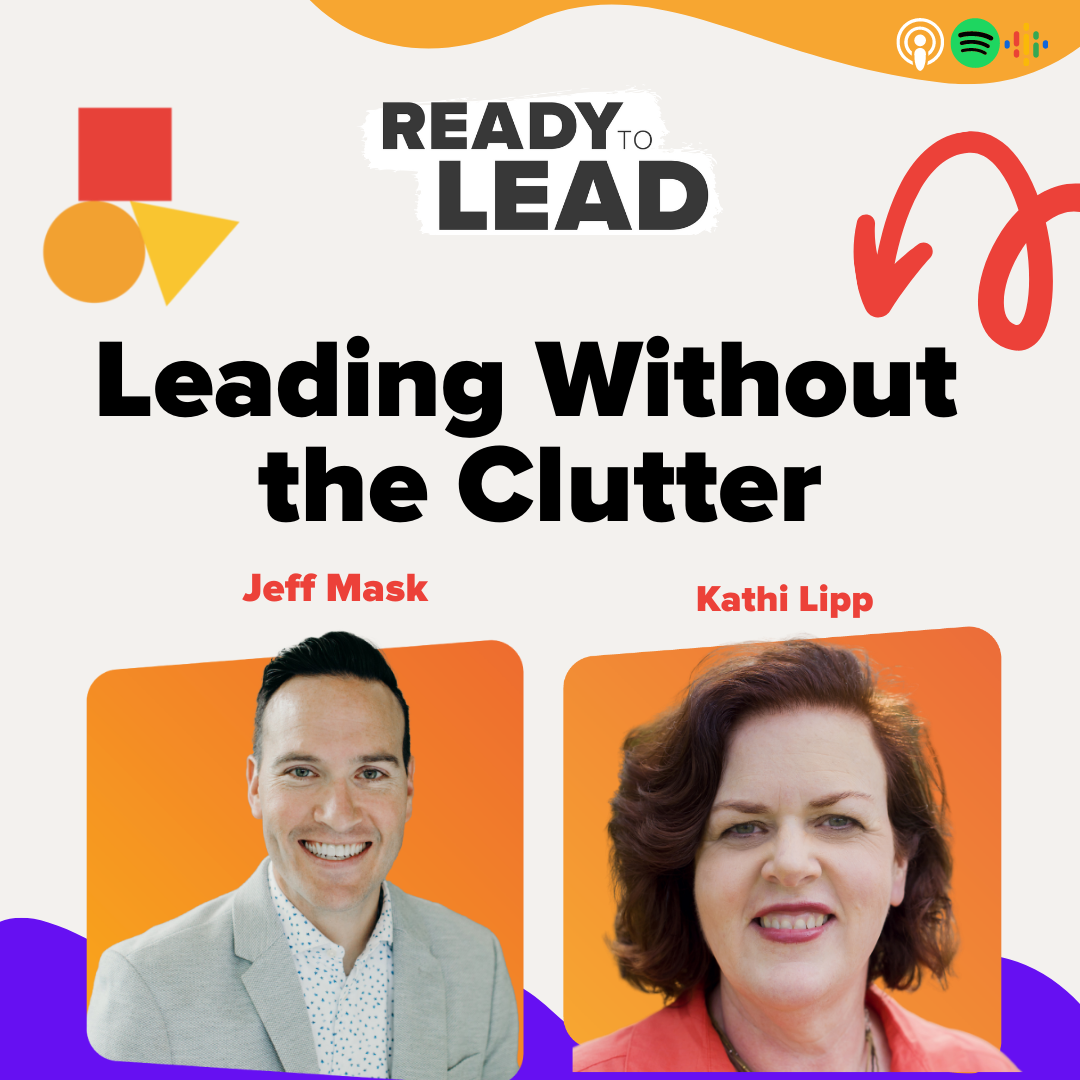What does decluttering have to do with leadership? Way more than you think.
In today’s episode, host Jeff Mask sits down with Kathi Lipp, world-renowned author of over 20 books and host of the Clutter-Free Academy podcast. Kathi has dedicated her life to serving people who are overwhelmed by clutter and people with a mission who want to communicate it.
Why talk about decluttering on a leadership podcast? Because there are a lot of grounding principles here for leading ourselves and leading others. When we have cluttered minds, when we have cluttered systems and processes, when we don’t have clarity, it’s so much more anxiety-inducing to lead.
Listen in as Jeff and Kathi talk about how decluttering leads to more peaceful, powerful, and effective leadership.
The Damaging Effects of Clutter
Years ago, Kathi was a young mom, heading into a dark place, overwhelmed by her house and life and stuff. Her dad was a hoarder. They didn’t call it that then, but that’s what he was. She tried all the programs and strategies, but nothing worked. Until she figured out that it was more than just having too much stuff. What is my relationship to stuff? she asked herself. Why do I have this need to keep bringing things into my home?
She realized that it was more of a mental/spiritual issue than a stuff issue. “Once I dug into that and dealt with it,” she says, “I was able to find freedom. I’m not Martha Stewart, but I could invite you in for a cup of coffee at any time without having to apologize, and that’s a big leap for me.”
Kathi says that, when you know that you’re different and you don’t understand why, it wreaks havoc with what you can potentially do. When you can’t have people over, when you can’t get out the door on time, when you only have one area of the house where you can aim your Zoom camera, it limits who you can become and who your partner/children can become.
Clutter is just a physical manifestation of what’s going on inside of us emotionally or spiritually. If you’re not coping in an area, it will seep out somewhere else. Clutter can lead to depression for many people. If you are depressed, you have clutter. If you have clutter, you’re dealing with some level of depression.
How Clutter Affects Us As Leaders
Decluttering enables us to clear out the closets of our minds, to help us be more present as leaders. It helps us let go of the heavy, painful anchors that are holding us back from becoming the true person we could be. So we can lead our team to be their best selves too.
What is one thing leaders can do to start down this path toward peace and clarity? Kathi says she’s a big believer in picking one thing and focusing on it for 15 minutes. If you have 20 things on your to-do list, and you haven’t prioritized them, you aren’t going to be able to tackle them without feeling frozen. She uses this 15-minute principle in her work, her environment, and her creativity. It ups her creativity and productivity—everything she needs to be a good leader.
She recommends that leaders start by clearing a space on their desk. She sits down every day and writes ten 15-minute items. Things that will push her business forward. She also chooses one thing to do an hour-long deep dive on. She asks: What is one thing I need to spend some concentrated time on? Then she puts it on her schedule.
“We overestimate what we can get done in a week, and we underestimate what we can get done in a moment,” she says. “Fifteen minutes is a moment, and we can actually get a lot accomplished.” Kathi suffers from bright shiny object syndrome. (Don’t we all?) Everything else in the world besides what she’s doing looks more fun, more awesome. But she keeps bringing her focus back to the task at hand.
She reminds herself constantly: “I have to do the things I have to do so I can do the things I want to do.”
Setting Yourself Up for Success
Every new day, when you sit down at your desk, that’s your launch pad. This is what you’re launching from every day. Are you constantly in recovery from the day before? Or are you starting each day moving forward? Ask: What can I do right now to take care of my future self?
Right now Kathi is concentrating heavily on her health. If she wants to have a good week, she has to set aside time on the weekend to roast vegetables, cook brown rice, and lay out her workout clothes. She’s taking care of her future self. She also does that for her work when she clears her desk and makes her coffee the night before.
It’s not just being organized for the sake of being organized, she says. It’s about: can I make decisions now to make it easier tomorrow? Decisions take energy. Jeff agrees that so many leaders struggle from decision fatigue. If you get home from the office, or you leave your home office for the day, and you can’t decide what to eat, where to go, or whatever, you’re suffering from decision fatigue. As leaders, we’re constantly making decisions. If we can eliminate some of that through future planning and organization, we’ll make our lives a little less taxing and trying and heavy.
Don’t Spend All Your Time Organizing Instead of Living
Kathi has met a lot of leaders who like to appear organized, but don’t understand what true organization is. She once worked with a guy (back in the pager era) who had all the systems—notebooks, planners, everything cross-referenced. She was in awe. Then a coworker told her that this guy spends all this time just saddling up. He spends so much time on his systems that he never gets on the horse and goes anywhere. If you’re spending more than 5% of your time getting/staying organized, look at your systems and see if you’re doing the right thing. Don’t over-engineer this. If you’re spending all your time organizing your life and not actually living your life, you’re avoiding something.
Set yourself up for success the night before. Get really clear on what the most important priorities are. Set 15-minute power times. Know yourself best. Know your rhythms. And schedule everything around that.
For Kathi’s life work, part of her has to be creative and part of her has to execute. She’s most creative in the morning. That’s when she does her writing, blogging, and podcasting. Executing and meetings are in the afternoon. It’s not because she wants to give her coaching clients less. It’s because she’s already lived out her purpose today. Meeting with people is her most energizing work. She writes 500 words a day, but writing does not bring her joy. People do.
She says we are constantly having to balance our space, time, energy, and money. Why would we allow things into our space that aren’t serving us? The more you get rid of, the more it will increase your peace.
She says we keep stuff for three reasons: fear (what if I need it someday?), guilt (Aunt Tillie gave it to me) and shame (I spent so much money on it, I need to keep it for the rest of my life). It’s a spiritual issue and it can be dealt with. We are not stuck.
“There is a message, a business, something that only you can bring to the world,” Kathi says. “Throw off anything that is keeping you from doing that. Spend time on your biggest hindrance so you can be the biggest blessing to the world that you were created to be.”
Richard and Jeff want to hear from YOU. Was something in today’s episode a big aha moment for you? Anything you disagreed with? What clutter do you need to remove from your life so you can be a better leader? Email them here with your thoughts/questions: feedback@readytolead.com
RESOURCES:
OTHER SHOWS YOU MIGHT ENJOY:
- Business Lunch with Roland Frasier and Ryan Deiss
- Perpetual Traffic with Ralph Burns and Kasim Aslam
- DigitalMarketer Podcast with Mark de Grasse


